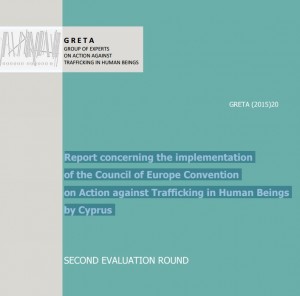Read the report here
The Council of Europe’s Group of Experts on Action against Trafficking in Human Beings (GRETA) has published today its second evaluation report on Cyprus. The report assesses progress made over the last four years in implementing the Council of Europe’s Convention on Action against Trafficking in Human Beings, following the publication of GRETA’s first evaluation report in September 2011.
GRETA’s report notes that progress has been made in a number of areas. The Cypriot authorities have further developed the legal framework for combating trafficking in human beings, in accordance with GRETA’s recommendations, and have adopted a new, comprehensive anti-trafficking law aimed at making anti-trafficking measures more effective. The number of identified victims of trafficking for the purpose of labour exploitation has been growing and the adoption of legislation providing for stricter rules to prevent employment agencies’ involvement in human trafficking offences is a welcome development. Further, the capacity of the specialised Police Office for Combating Trafficking in Human Beings has been strengthened and its mandate has been expanded.
However, GRETA urges the Cypriot authorities to increase their efforts to prevent trafficking for the purpose of labour exploitation, in particular by strengthening the supervision of private employment agencies, stepping up labour inspections, and strengthening protection measures for domestic workers.
GRETA also calls on the Cypriot authorities to ensure that safe and suitable accommodation is provided for all victims of trafficking, according to their needs. Another recommendation concerns the improvement of the procedure for the identification and referral to assistance of child victims of trafficking, by involving child specialists and child protection services.
Furthermore, considering the difficulties for victims of trafficking to receive compensation from perpetrators, GRETA urges the Cypriot authorities to set up as a matter of priority a victim compensation fund. It is also necessary to provide victims of trafficking with effective access to legal aid and build the capacity of legal practitioners to support victims to claim compensation.
Read the report here.





